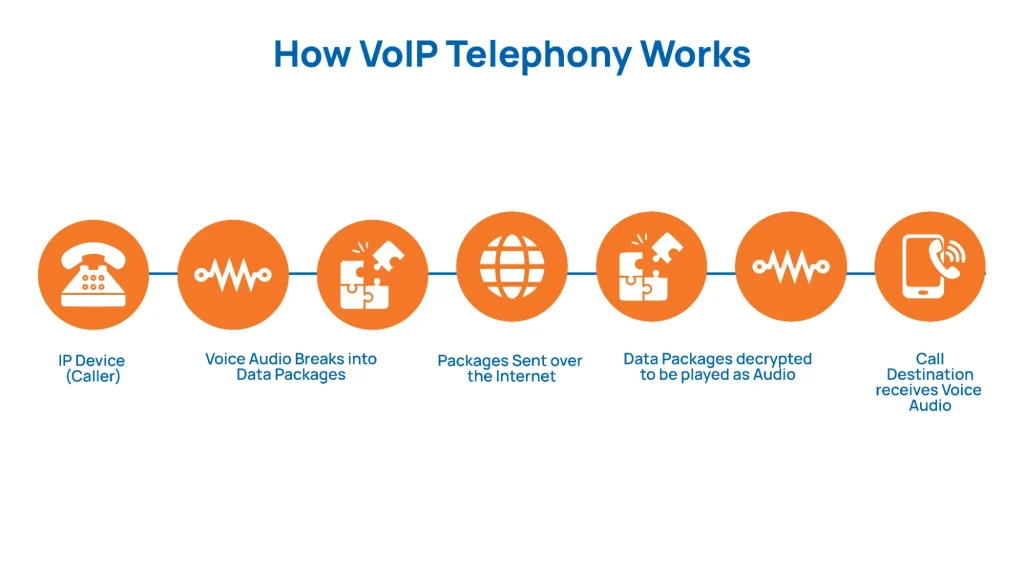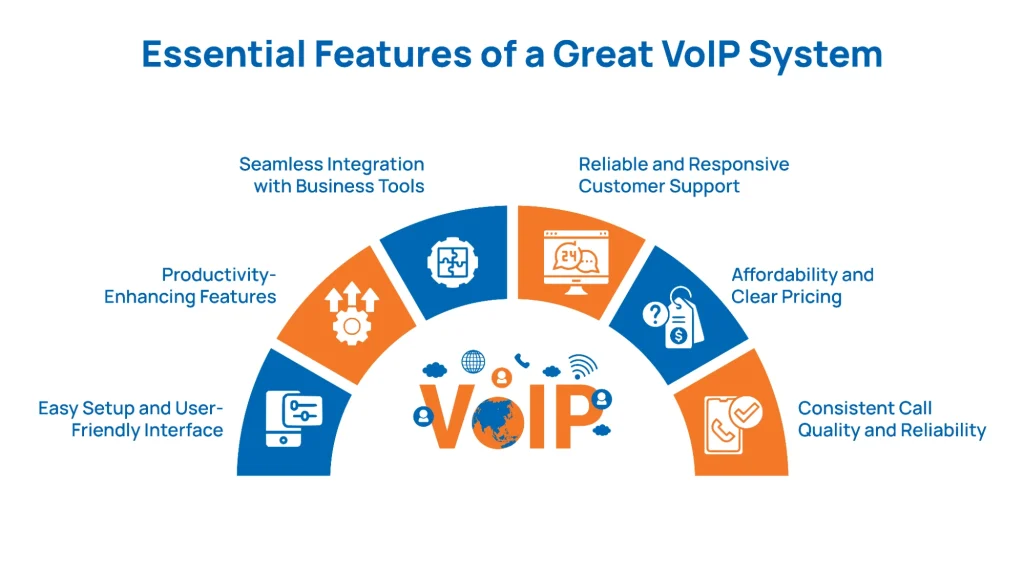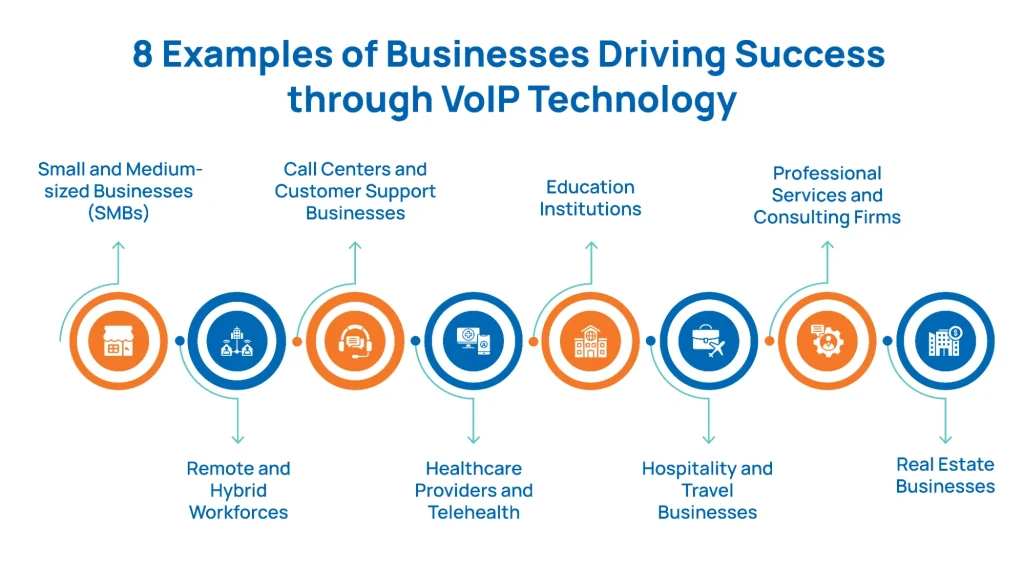Key Takeaways
|
The Fundamentals of VoIP: What Every Business Should Know
Voice over Internet Protocol (VoIP) is a modern communication technology that allows users to make phone calls over an internet connection instead of traditional telephone networks. VoIP solutions provide businesses with a more flexible, cost-effective way to stay connected. They offer features like call routing, video conferencing, and system integrations that are beyond what standard phone systems can deliver. Here’s how VoIP technology works:
- Conversion: Your voice is transformed into digital data packets.
- Transmission: These packets travel through the Internet and reach the receiver.
- Reconversion: Upon arrival, digital packets are converted back into voice signals, enabling the recipient to hear clearly.
Essential Features of a Great VoIP System
 Selecting the right system is crucial for unlocking the full potential of VoIP solutions, especially for growing teams and startups. Here are the essential attributes to consider to ensure your VoIP for small business setup aligns with your communication goals:
Selecting the right system is crucial for unlocking the full potential of VoIP solutions, especially for growing teams and startups. Here are the essential attributes to consider to ensure your VoIP for small business setup aligns with your communication goals:
-
Easy Setup and User-Friendly Interface
-
Productivity-Enhancing Features
-
Seamless Integration with Business Tools
-
Reliable and Responsive Customer Support
-
Affordability and Clear Pricing
-
Consistent Call Quality and Reliability
VoIP for Business: What Makes It Worth the Switch?
If you’re still on the fence about switching to VoIP, here is how your business can benefit:-
Cost Efficiency and Savings
-
Easily Scalable Communication Systems
-
Improved Customer Service & Satisfaction
-
Simple Maintenance and Reliability
-
Integration with Business Applications
-
Enhanced Security and Compliance
-
Detailed Analytics and Reporting
8 Examples of Businesses Driving Success through VoIP Technology
 Below is a list of businesses that can significantly benefit from utilizing VoIP technology to enhance communication, reduce costs, and drive success.
Below is a list of businesses that can significantly benefit from utilizing VoIP technology to enhance communication, reduce costs, and drive success.
-
Small and Medium-sized Businesses (SMBs)
- Virtual Receptionist: Acts as an automated attendant, greeting customers professionally and routing calls efficiently, enhancing customer satisfaction.
- Cost-effective Calls: Offers affordable local and international calling rates, helping businesses better manage operational expenses.
- Easy Integration: Quickly integrates with typical productivity applications like email, calendars, and project management tools, streamlining workflow and boosting productivity.
-
Remote and Hybrid Workforces
- Video conferencing provides high-quality, face-to-face meetings, regardless of team members' locations, facilitating collaboration and reducing misunderstandings.
- Mobile Compatibility: Supports smartphones and tablets, allowing employees to stay connected.
- Unified Communications: Combines various communication channels, including voice, messaging, and video conferencing, within one easy-to-use platform.
-
Call Centers and Customer Support Businesses
- Automatic Call Distribution (ACD): Routes incoming calls evenly across available agents, minimizing customer wait times and balancing workloads.
- Interactive Voice Response (IVR): This system guides callers using automated voice prompts, quickly connecting them with the right department or service representative.
- Call Recording and Analytics: We record calls for quality assurance and compliance and provide analytics to enhance agent training and customer satisfaction.
-
Healthcare Providers and Telehealth
- Secure Video Consultations: Provides encrypted video conferencing to maintain patient privacy and comply with HIPAA regulations.
- Appointment Reminders: Automatically sends reminders via calls or text, significantly reducing appointment no-shows.
- Voicemail-to-Email: Transcribes voicemail messages into emails, making it easy to document and respond to patient queries promptly.
-
Education Institutions
- Online class hosting enables institutions to conduct virtual classes seamlessly, including recording sessions for later review.
- Parent-Teacher Conferencing: Facilitates convenient, clear communication between educators and parents, improving student performance and engagement.
- Automated Notifications: Quickly sends emergency alerts, schedule changes, and important announcements to large groups instantly.
-
Hospitality and Travel Businesses
- Room-to-Room Communication: Simplifies guest interaction with hotel services, improving convenience and service delivery.
- Integration with Booking Systems: This integration connects the phone system directly with reservation platforms and CRM software, streamlining guest management.
- Customer Service Management: Manages incoming guest inquiries efficiently, enabling fast responses and personalized attention.
-
Professional Services and Consulting Firms
- Conference Calling: Enables smooth, professional virtual meetings with clients and internal teams, saving time and travel expenses.
- Call Forwarding: Ensures consultants remain reachable even when working remotely or traveling, preventing missed business opportunities.
- CRM Integration: Connects client interactions directly to CRM systems, allowing easy tracking, follow-up, and improved client relationship management.
-
Real Estate Businesses
- Mobile Applications: Allow agents to communicate effectively while in the field, keeping them accessible and responsive to clients.
- Virtual Numbers: Offers local phone numbers to establish a trusted presence in specific markets, even if agents work remotely.
- Call Recording: Captures and documents meaningful client conversations, ensuring transaction compliance and clarity.
Essential Factors to Consider Before Choosing VoIP for Your Business
Selecting the right VoIP solution requires careful evaluation of several important factors. Here are important points businesses should consider to ensure the chosen system matches their unique communication needs:-
Evaluate Your Communication Needs
-
Analyze Your Budget and Cost-Efficiency
-
Consider Essential Software Integrations
-
Assess Security and Compliance Needs
The Essential Steps for Implementing VoIP in Your Business
Switching to a VoIP system involves precise planning and execution. Here are the essential steps businesses should follow for a smooth transition:1. Identify Your Communication Requirements
First, clearly define what your business needs from a phone system. Consider call volume, the number of employees, remote work capabilities, and necessary features like call forwarding, video conferencing, or voicemail transcription. Understanding these needs helps ensure the VoIP solution effectively fits your business.2. Select the Right VoIP Provider and Features
Choose a provider offering features aligned with your identified requirements. Compare providers based on pricing, reliability, quality of customer support, and integrations with existing tools. Prioritize providers that can scale with your business growth.3. Evaluate Your Internet Connection and Infrastructure
VoIP relies on a stable internet connection. Before implementing, thoroughly test your current internet speed and bandwidth capacity. Upgrade your connection if needed to avoid call quality issues, such as dropped calls or poor audio quality.4. Train Employees and Introduce VoIP Gradually
Help employees transition smoothly by providing thorough training on using the new system. Start by implementing VoIP in smaller teams or specific departments first, then gradually expand it company-wide. This approach reduces disruptions and ensures your team is comfortable with the technology.5. Monitor, Review, and Optimize
Once the VoIP system is in place, regularly monitor its performance. Collect employee feedback about ease of use, call quality, and functionality. Use this information to make any necessary adjustments or upgrades, ensuring the system continues to meet your business's evolving communication needs.Why is PerfectSoft Connect the Right Choice for Your Business?
Now that you’ve explored various ways businesses use VoIP, it’s time to choose the right provider. PerfectSoft Connect offers reliable VoIP solutions made specifically for contact centers. These solutions ensure clear voice quality, strong security, and compliance with industry regulations. With features like call routing, IVR menus, call monitoring, and encryption, it helps teams manage both inbound and outbound communication more efficiently without the need for complex installations. It acts as a VoIP solution that can support your business as communication needs evolve.Scale Your Business with Affordable, Reliable VoIP Solutions from PerfectSoft.AI
 At PerfectSoft.AI, we deliver intelligent, high-performance contact center solutions to improve customer satisfaction, boost agent productivity, and streamline operations.
Whether you manage a large-scale BPO, a customer service department, or an outbound sales team, our technology helps you stay connected across all channels while ensuring crystal-clear
We provide advanced VoIP-based Telecom Voice Services that guarantee:
At PerfectSoft.AI, we deliver intelligent, high-performance contact center solutions to improve customer satisfaction, boost agent productivity, and streamline operations.
Whether you manage a large-scale BPO, a customer service department, or an outbound sales team, our technology helps you stay connected across all channels while ensuring crystal-clear
We provide advanced VoIP-based Telecom Voice Services that guarantee:
- High-Quality Voice Calls – Clear and uninterrupted voice communication.
- Reliable Connectivity – Stable and secure connections across all regions.
- Global Reach – Seamless communication with teams and customers worldwide.


Comments